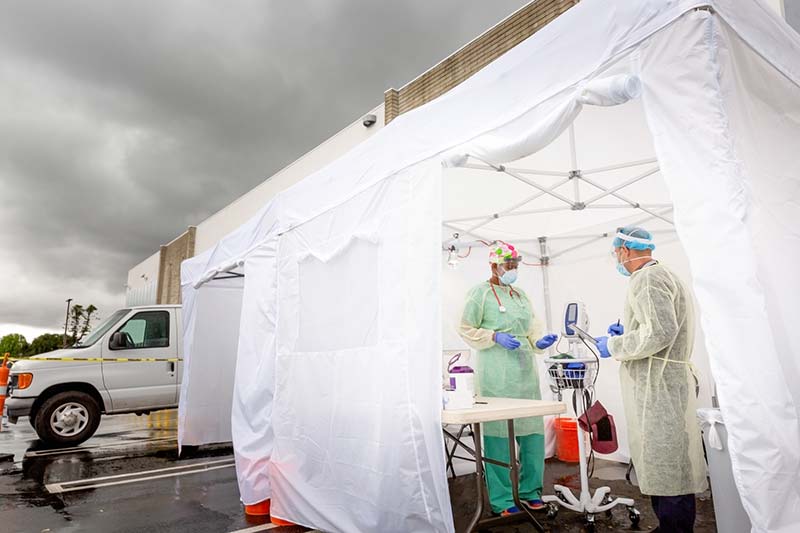Federal prosecutors are ramping up efforts to combat fraud against COVID-19 relief programs, including the Accelerated and Advance Payment Program and the Provider Relief Fund, both of which assisted hospitals and other healthcare providers during the pandemic. In April 2021, the U.S. Department of Justice (DOJ) charged a Colorado physician for alleged fraud against these programs and a third pandemic-relief program. This marked the first time that charges were brought for fraud against the Accelerated and Advance Payment Program and the second time for the Provider Relief Fund. However, additional actions alleging fraud against these programs are expected in upcoming months.
Accelerated and Advance Payment Program
When the pandemic struck, hospitals and other healthcare providers saw a sudden drop in revenue as elective procedures, admissions, and visits were canceled amid lockdown orders. CMS took steps to limit the financial impact on healthcare providers by expanding the Accelerated and Advance Payment Program, which existed before the pandemic and was designed to mitigate cash flow issues and claims processing disruptions during an emergency. CMS made the program available to a broader group of Medicare Part A providers and Part B suppliers, and enhanced benefits and flexibility including the extension of repayment timeframes.
Beginning in March 2020, Medicare accelerated payments to hospitals, and gave advance payments to physicians and other health care providers, to minimize the effects of the pandemic-related disruptions. By May 2020, CMS had distributed $100 billion to impacted providers through the program, with the bulk of the payments ($92 billion) going to providers who participate in Medicare Part A, which pays for inpatient hospital stays, skilled nursing facility care, home health, and hospice care. The remainder went to Part B providers and suppliers.
Provider Relief Fund
Also in March 2020, Congress announced the Provider Relief Fund, a $178 billion program that was part of the Coronavirus Aid, Relief, and Economic Security (CARES) Act. Qualified providers of healthcare, services, and support received Provider Relief Fund payments for healthcare-related expenses or lost revenue due to COVID-19. These distributions did not need to be repaid to the government as long as providers complied with specified terms and conditions.
The Indictment
The DOJ announced charges against Francis Joseph, M.D., a Colorado physician, for allegedly misappropriating nearly $300,000 from federal health care programs in addition to the Paycheck Protection Program (PPP).
According to the indictment, Dr. Joseph allegedly committed fraud against the Accelerated and Advance Payment Program by submitting an advance payment request form for a medical practice at which he had previously relinquished control. He then transferred funds from the medical practice’s operating account to a personal bank account despite some funds having been paid by the Medicare administrative contractor as an advance payment. The Department of Justice detailed the allegations in a lengthy complaint, the first in connection to fraud related to a federal COVID-19 health care relief program.
The DOJ also alleged that Dr. Joseph misused Provider Relief Fund distributions. Dr. Joseph’s former medical practice met the criteria for a Provider Relief Fund distribution of $31,782, and he allegedly transferred those funds from the medical practice’s operating account to a personal bank account. This marked the DOJ’s second indictment alleging fraud against this program; the first came in February against a home health provider.
Finally, prosecutors charged Dr. Joseph with fraud against the PPP, a federal COVID-19 relief program intended to provide low- interest loans to qualified small businesses and organizations. The loans were forgiven if the funds were used properly to cover payroll and other qualifying expenses. To date, hundreds of defendants have been charged in PPP fraud cases.
Dr. Joseph allegedly submitted a fraudulent PPP application seeking a loan for about $179,999. The DOJ said he made several misrepresentations, including that he was the owner of the medical practice when in fact his termination preceded the application date by two months. After the loan was approved, the funds were allegedly deposited into an unofficial business bank account that Dr. Joseph had opened in the name of the medical practice shortly before his termination. He then allegedly used the funds to pay for personal travel and home improvements.
The Takeaway
Given the staggering price tag of COVID-19 aid programs – the CARES Act alone included $2.2 trillion in pandemic relief – the DOJ has made cracking down on fraud against COVID-19 programs a primary focus of its enforcement efforts. As the case involving Dr. Joseph illustrates, the dollar sums involved need not be in the millions to capture the DOJ’s attention.

